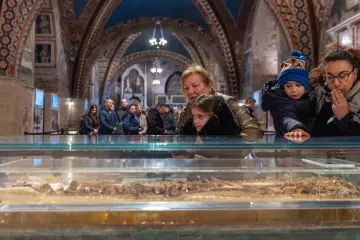Sunday Scripture: The last days of the incarnate Son of God
By Father Timothy P. Schehr
Palm Sunday: Isaiah 50:4-7; Philippians 2:6-11; Luke 22:14-23:56
This Sunday we hear the dramatic account of the Lord’s suffering and death. It is no surprise that this is the most elaborate narrative in each of the Gospels. The details of the last days the incarnate Son of God walked among us would have naturally been highly valued by the earliest Christian communities.
Like the others Gospels, Luke has material in his Passion Narrative that is unique. Only in this Gospel does Jesus remind his apostles that while he was with them they were in want of nothing. He tells them, things will soon change dramatically. They must be prepared. Jesus even says each of them must now buy a sword. He is not speaking literally here, but the apostles take it that way and declare they have two swords already at hand. Jesus was talking about the spiritual readiness they must each display in the challenging days that lie ahead (Luke 22:35-38).
Another scene unique to this Gospel records the Lord’s presence in the court of Herod (Luke 23:6-12). This is Herod Antipas, who beheaded John the Baptist (Luke 9:7-9). Luke tells us Herod was overjoyed to finally see Jesus in person. But his interest in the Lord is entirely superficial. Out of mere curiosity he wants to see Jesus work some sign. When Jesus refuses to respond to Herod’s flood of questions, the tetrarch’s curiosity quickly turns to contempt. He resorts to mockery and robes Jesus as a king before returning him to Pilate. At this point Luke adds a special note. He tells us that on that very day Herod and Pilate became friends, replacing their previous animosity. They are united in their dismissal of Jesus. Worldly interests have bonded them. Readers may recall that at the beginning of this gospel Luke addressed someone named Theophilus, meaning “Friend of God.” Luke seems to be contrasting two kinds of friendship: one with God and one based on mere earthly values.
One of the most familiar additions to Luke’s account involves the opposing views of the two criminals crucified with Jesus (Luke 23:39-43). The first protests that if Jesus is the Anointed One then He should save himself and them as well. His viewpoint is limited to this world only. And he is completely misguided in thinking that Jesus came to into this world to save himself. The other criminal — known in tradition as Dismas — rebukes the other for his lack of respect for God. He reminds the other that the two of them have been condemned for crimes committed, while Jesus is entirely innocent. Then Dismas exhibits profound understanding of the Lord’s mission. He asks to be remembered when Jesus enters His kingdom. Jesus assures him he will be enjoying the gift of eternal life that very day.
The denials of the apostle Peter are prominent in every account of the Lord’s passion. But Luke adds details that look ahead to Peter’s reconciliation with the Lord as well as his bold proclamation of the gospel in Luke’s Acts of the Apostles. At the Last Supper Jesus assures Peter that He has been praying that his faith does not fail. Jesus even informs Peter that after a while, when he comes back to his Lord, he will be the one to give support to the others (Luke 22:32). One example of Peter doing exactly this comes in the first chapter of Acts. Peter is the one who initiates finding a replacement for Judas (Acts 1:15-26).
Just as the Lord said, Peter denies him three times before a cock crows. But at that point Luke adds the detail that Jesus turned and looked at his apostle (Lk 22:61). The bond between Peter and his Lord has not been severed by those denials.
Father Schehr is a faculty member at the Athenaeum of Ohio.













